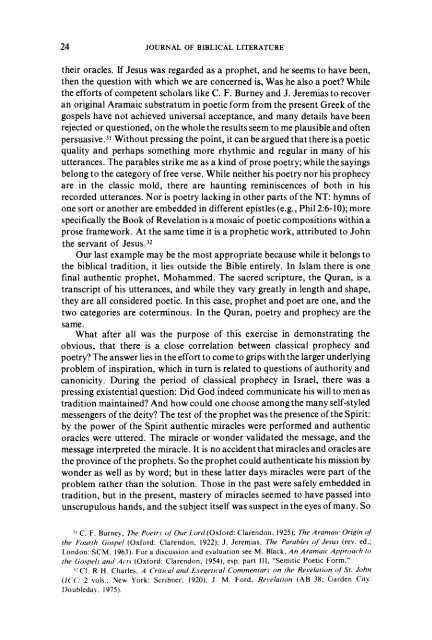POTTERY, POETRY, AND PROPHECY: AN ESSAY ON BIBLICAL ...
POTTERY, POETRY, AND PROPHECY: AN ESSAY ON BIBLICAL ...
POTTERY, POETRY, AND PROPHECY: AN ESSAY ON BIBLICAL ...
Create successful ePaper yourself
Turn your PDF publications into a flip-book with our unique Google optimized e-Paper software.
24<br />
JOURNAL OF <strong>BIBLICAL</strong> LITERATURE<br />
their oracles. If Jesus was regarded as a prophet, and he seems to have been,<br />
then the question with which we are concerned is, Was he also a poet? While<br />
the efforts of competent scholars like C. F. Burney and J. Jeremias to recover<br />
an original Aramaic substratum in poetic form from the present Greek of the<br />
gospels have not achieved universal acceptance, and many details have been<br />
rejected or questioned, on the whole the results seem to me plausible and often<br />
persuasive.31 Without pressing the point, it can be argued that there is a poetic<br />
quality and perhaps something more rhythmic and regular in many of his<br />
utterances. The parables strike me as a kind of prose poetry; while the sayings<br />
belong to the category of free verse. While neither his poetry nor his prophecy<br />
are in the classic mold, there are haunting reminiscences of both in his<br />
recorded utterances. Nor is poetry lacking in other parts of the NT: hymns of<br />
one sort or another are embedded in different epistles (e.g., Phil 2:6-10); more<br />
specifically the Book of Revelation is a mosaic of poetic compositions within a<br />
prose framework. At the same time it is a prophetic work, attributed to John<br />
the servant of Jesus.32<br />
Our last example may be the most appropriate because while it belongs to<br />
the biblical tradition, it lies outside the Bible entirely. In Islam there is one<br />
final authentic prophet, Mohammed. The sacred scripture, the Quran, is a<br />
transcript of his utterances, and while they vary greatly in length and shape,<br />
they are all considered poetic. In this case, prophet and poet are one, and the<br />
two categories are coterminous. In the Quran, poetry and prophecy are the<br />
same.<br />
What after all was the purpose of this exercise in demonstrating the<br />
obvious, that there is a close correlation between classical prophecy and<br />
poetry? The answer lies in the effort to come to grips with the larger underlying<br />
problem of inspiration, which in turn is related to questions of authority and<br />
canonicity. During the period of classical prophecy in Israel, there was a<br />
pressing existential question: Did God indeed communicate his will to men as<br />
tradition maintained? And how could one choose among the many self-styled<br />
messengers of the deity? The test of the prophet was the presence of the Spirit:<br />
by the power of the Spirit authentic miracles were performed and authentic<br />
oracles were uttered. The miracle or wonder validated the message, and the<br />
message interpreted the miracle. It is no accident that miracles and oracles are<br />
the province of the prophets. So the prophet could authenticate his mission by<br />
wonder as well as by word; but in these latter days miracles were part of the<br />
problem rather than the solution. Those in the past were safely embedded in<br />
tradition, but in the present, mastery of miracles seemed to have passed into<br />
unscrupulous hands, and the subject itself was suspect in the eyes of many. So<br />
1' C. F. Burney, The Poetri of Our Lord(Oxford: Clarendon, 1925); The Aramaic Origin of<br />
the Fourth Gospel (Oxford: Clarendon, 1922); J. Jeremias, The Parables of Jesus (rev. ed.;<br />
London: SCM, 1963). For a discussion and evaluation see M. Black, An Aramaic Approach to<br />
the Gospels and Acts (Oxford: Clarendon, 1954), esp. part III, "Semitic Poetic Form."<br />
3' Cf. R.H. Charles, A Critical and Evegetical Commentary on the Revelation of St. John<br />
(ICC, 2 vols.; New York: Scribner, 1920); J. M. Ford, Revelation (AB 38; Garden City:<br />
Doubleday, 1975).
















